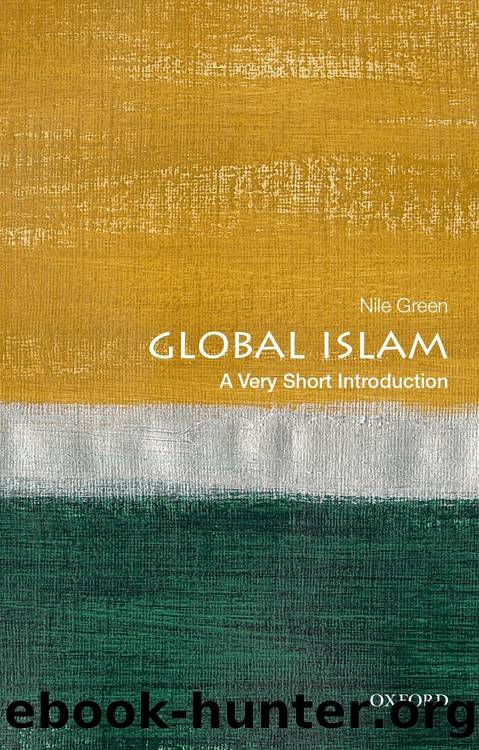Global Islam by Nile Green

Author:Nile Green [Green, Nile]
Language: eng
Format: epub
ISBN: 9780190917258
Publisher: Oxford University Press
Published: 2020-08-28T00:00:00+00:00
Mobile vanguards of the call for revolution
While the Tablighi Jamaat promoted a nonpolitical version of Islam (at least at the level of state politics), Pakistan also hosted the Jamaʻat-i Islami (Islamic Society), which was devoted to establishing an international Islamic state.
The JamaÊ»at-i Islami was founded in 1941 in India by Abul AÊ»la Maududi (1903â79), who subsequently shifted the groupâs headquarters to Pakistan to challenge the new countryâs secular founders. Like Hasan al-Banna, the founder of the Muslim Brotherhood, Maududi was not a trained member of the ulama. Rather, he was a journalist who learned the value of mass media through his participation in the campaign to save the Ottoman caliphate. In 1933, he founded his Urdu journal, Tarjuman al-Quran (Interpreter of the Quran), which publicized his ideas for the rest of his life. He also wrote many short books and the six-volume Tafhim al-Quran (Understanding the Quran), which claimed that the scriptures urged Muslims to struggle for the foundation of an Islamic state.
Maududi presented the Quran as a political textbook centrally concerned with the concept of hakimiyya (sovereignty). Since legitimate sovereignty can only be divinely ordained, it requires states run in accordance with Sharia. According to Maududi, the installation of divine sovereignty was perpetually undermined by shirk, a Quranic term that traditionally meant idolatry but that he expanded to include all opposition to divine rule, which is to say, to the foundation of an Islamic state. Moreover, since divine sovereignty is indivisible, like the deity himself, such a state must likewise be a single, worldwide one. By this reasoning, nation-states that failed to implement Sharia served only to further perpetuate shirk, even if they were controlled by nominal Muslims, so the duty of every Muslim was to oppose them with every ounce of their being. For Maududi, the Quran provided the commandments and lessons for how to do so, via violent jihad if necessary. This notion of jihad as political struggle formed the basis of Maududiâs transformation of Islam into an ideologyâthat is, into an explanatory program towards a defined political goal.
For all his talk of returning to the core teachings of the Quran, Maududi was deeply influenced by the global political currents of his time. He borrowed key political concepts, such as the notion of an inqilab (revolution) led by a giroh (vanguard), from the lexicon of the Indian Marxists he encountered during his years as a journalist. Having come of age under British rule over India, he also shared the antipathy to the imperialist West of his Marxist contemporaries, though, like al-Banna, he sought to replace Western hegemony with state-implemented Sharia. After moving to Pakistan and transforming the Jamaʻat-i Islami into a transnational political party, he came to regard Asian and Middle Eastern nationalists as the divisive enemies of his global Islamic revolution.
As a result of his revolutionary activism, Maududi found himself repeatedly imprisoned by the Pakistani authorities and even sentenced to death. But the compromises of Pakistani secularism saw Maududi no less frequently pardoned and released, leaving him free to travel and lecture worldwide.
Download
This site does not store any files on its server. We only index and link to content provided by other sites. Please contact the content providers to delete copyright contents if any and email us, we'll remove relevant links or contents immediately.
The History of Jihad: From Muhammad to ISIS by Spencer Robert(2628)
Nine Parts of Desire by Geraldine Brooks(2368)
The Turkish Psychedelic Explosion by Daniel Spicer(2356)
The First Muslim The Story of Muhammad by Lesley Hazleton(2271)
The Essential Rumi by Coleman Barks(2046)
1453 by Roger Crowley(2030)
The Last Mughal by William Dalrymple(1857)
Trickster Travels: A Sixteenth-Century Muslim Between Worlds by Davis Natalie Zemon(1847)
Muhammad: His Life Based on the Earliest Sources by Martin Lings(1646)
God by Aslan Reza(1641)
by Christianity & Islam(1632)
A Concise History of Sunnis and Shi'is by John McHugo(1567)
No God But God by Reza Aslan(1545)
Magic and Divination in Early Islam by Emilie Savage-Smith;(1534)
The Flight of the Intellectuals by Berman Paul(1503)
Nothing to Envy by Barbara Demick(1450)
Art of Betrayal by Gordon Corera(1430)
What the Qur'an Meant by Garry Wills(1394)
Getting Jesus Right: How Muslims Get Jesus and Islam Wrong by James A Beverley & Craig A Evans(1342)
